Borderless house is a multicultural ‘community’ share house in which young people from all over the world cultivate international cultural exchange by gathering and living under one roof.
This cross-cultural share house provides not only an opportunity for improving your English skills but also a chance to create a great community of locals and foreigners, as well as an opportunity to learn new perspectives.
Many of our tenants from all over the world have a unique sense of humor and experiences that you could never imagine.
From this, we started a new project called “Borderless tenants”, which consists of interviewing tenants about how they have changed or grew as a person through their experiences at Borderless house.
The second interviewee of this series is Mr. guhee, a tenant of Borderless house for the last year and a half. He chose to live here because he decided to start studying English before he turns 30 years old.
We asked him about his great progress in his English skills and his change from a Japanese to a foreign company.
My big change before turning 30.Start your preparation for working abroad at Borderless house.

ーThank you for joining us. Please introduce yourself.
My name is Gohee. I will turn 32 years old this year. My housemates call me ‘Gohee or Gucchi’.
I have been living in the Shinagawa-oimachi house since October 2018, so for almost one and a half years. I love sports and play tennis and go bouldering quite often. Before COVID19, my housemates and I used to go play sports together once a week.
I like cooking as well, so I would sometimes cook for my housemates or we would cook together.
ーWhat made you move into Borderless house?
Just before turning 30 years old, I was looking back on my career and thought that I would like to try working abroad. Then I decided to start studying English to achieve this, and that is why I decided to move into Borderless House.
When I asked my friend for advice, he said ‘quit your job now and go study abroad’
However, I didn’t want to quit my job at the time, so I was looking for a better option. This was when I decided to study English on my own.
I started looking for a share house that would allow me to live with people from other countries and
found Borderless House.
ーSo you decided to move into a share house at the age of 30! Were you living alone until then?
Yes, I have lived by myself for 7 years in Tokyo and this was my first time living in a sharehouse.
The most impressive moment for me was my housemates threw a birthday party for me on the day I moved in

ーDid you have any problems whilst living with others?
A lot of things left an impression on me, rather than actual problems.
The day that I had moved in may have left the biggest impression on me.
That day happened to be the day of housemate’s birthday party.
I was invited to go to see the fireworks by my housemates. So I went with them in the afternoon without even unpacking and celebrated his birthday at a Yakiniku restaurant.
On my first day…even though I didn’t know their faces and names yet, my housemates didn’t mind at all and took me with them. I still remember the feelings of surprise and confusion I felt that day very clearly.
ーGoing to see fireworks with your housemates on your very first day… That’s quite a unique experience! Are there any other memories that stand out for you?
My birthday party that was held 2 weeks after I moved in is also quite a good memory.
I was never able to show off my talent of “making nigiri sushi” until then, but it finally came in handy and it was a great hit.
I served my handmade Sushi to everyone and my housemates, especially my non-Japanese housemates were very impressed with how people can make Sushi by themselves!
At the Oimachi House, we always hold birthday parties and farewell parties for everyone and each of them is very good memories for me.
 (手巻き寿司パーティーの時の様子)
(手巻き寿司パーティーの時の様子)
ーIt is fantastic that a tradition of celebrating and sending people off has been built already in your Sharehouse. Do you go out together often?
We go out together often. We’ve been to Roppongi and Yoyogi-park to have picnics, we’ve attended a glass-making workshop, etc.
I like planning events and asking people to join, so last summer I made my own Nagashi-somen and it was a big hit!
Sharehouse is a place for practice; I learned English through my daily life
 ーIs there anything you decided to try out after moving in the sharehouse?
ーIs there anything you decided to try out after moving in the sharehouse?
My main objective behind living in Sharehouse was learning English, so I mainly tried studying and improving my ability to communicate in English.
When I moved in, I didn’t speak English so it was hard to communicate with my housemates, especially for the first 2 months. I just studied every day.
Other things that I tried to do besides studying by myself are going out with housemates, as well as attending parties and events to communicate with them more on my day off. Because of this, after a while, my English started to improve.
ーWhat else did you do to learn English? Please give us more details.
One of my housemates works at an English conversation school, so I studied with the textbooks and vocabulary books that he/she recommended.
One of the good aspects of living in an international share house is how I was able to try using new words and phrases in conversations with my housemates right after learning them.
ーHave your housemates helped with your studies?
As there were 10 non-Japanese residents in my share house at that time, and most of them didn’t speak Japanese, I was able to learn English by just being with them.
My housemates also helped me by giving me vocabulary quizzes when I was studying in the living room.
When I was studying for the TOEIC exam, they helped me until 2 in the morning.
ーHow much did your TOEIC score improve?
My score was in the 400s when I first moved in, but after a year at the share house, my score improved and went over 800. The fact that my score improved even though I didn’t study exclusively for the test and was only studying the basics made me realize how much my English improved. It made me really happy.
ーWas the greatest change you saw in yourself since moving in the improvement of your English skills?
While this is true, I think making friends from all over the world and experiencing first hand the differences in our ways of thinking was a larger change for me. I’d never had friends from foreign countries so it was very new to me.
For example, even though I knew that different countries have differences in education, there was never a chance for me to ask what kind of education they grew up with. It was interesting to learn what was different from Japanese education.
ーHas this change been useful in your daily life?
Since I live with housemates who have different perspectives, it became easier for me to accept different perspectives that people of different generations have.
My coworkers range from those in their 20s to those in their 50s and their perspectives are very different. Now I’ve changed and started to think “it’s normal for people to have different opinions, so how do we go about this?” whilst working.
There are more career options for me as my English has been improved
 ーWhat made you decide to change your job?
ーWhat made you decide to change your job?
Because my goal was to work abroad when I moved to the Borderless House, I thought my first step was to find a job where I can use English.
When I first moved in, I needed time to get used to the share house and study English. After about 6 months after moving in, I had become more confident in my English skills and then decided to look into changing my job more seriously.
ーWhat were your criteria when you were looking for a job? What did you prioritize?
As I had no experience using English in my career, I knew it would be difficult for me to work for a company that uses English as its official language. Therefore, I started by applying for Japanese companies, because I thought there would be a higher chance of me getting hired. However, it became possible for me to apply to foreign companies after my TOEIC scores improved and I had more options available to me.
ーWhat made you decide to work at your current company?
First of all, the company has offices in 15 countries worldwide, so it allows opportunities of getting transferred to foreign branches. Second of all, while the company’s official language is English, most of the company’s clients are Japanese businesses, so I am able to use both Japanese and English for communication. I think this is a good work environment for me, as I have just been studying English for a year.
ーBesides learning English, were there any other advantages in living in Borderless house whilst looking for a job?
It was good that I was able to get inside information on foreign companies that I didn’t know about. After I started applying for foreign companies, I realized how few foreign companies Japanese people knew about.
Before applying for the job, I wasn’t aware of the company I work for now. My British housemate gave me information and advice about it, and that was what made me apply.
I am grateful for being able to learn about various foreign companies from housemates who are from the county the company originated in.
ーWhat are your future goals now that you’ve experienced living in Borderless House?
My goal when I was 30 years old was to work abroad, but now my goal is to move to a foreign country by the time that I am 40.
The first step for me now is to be transferred to a foreign branch.
ーYou had said before that you didn’t know which country you would like to live in. How about now? Do you have a certain country in your mind?
I would like to try living in an English speaking country first.
However, I would love to live in Germany eventually. Before changing jobs I had the opportunity to go see a past housemate and traveled across 4 countries in Europe for the first time. I was very drawn to Germany then.
There is more than one way to learn English. However, being able to make friends from all over the world is the greatest benefit to stay at a share house
 ーFinally, please give one piece of advice to our future tenants!
ーFinally, please give one piece of advice to our future tenants!
There are many ways to learn English. You can go to a language school, using on-line English conversation classes, YouTube, etc.
But, if you live in Borderless house, you will not only learn English. You will also be able to learn different values and perspectives. The best part about living in Borderless house is that it allows you to make friends from all over the world!
ーYour story of setting goals, taking measures towards achieving that goal will surely be helpful for future tenants thinking of joining with the intention of learning English! Thank you so much for your fantastic story Guhee-san!
Editor’s Note
What did you think about Higuchi-san’s story?
Please refer to Higuchi-san’s notes when thinking about life at the sharehouse or finding a new way to learn English. He has shared his specific methods of studying and his process of finding a new job.
gooheeさんHiguchi-san’s Notes
Meeting new people will definitely lead to a great change.
Borderless house is filled with unique and diverse people from all over the world.
Why don’t you join us and experience “change”?











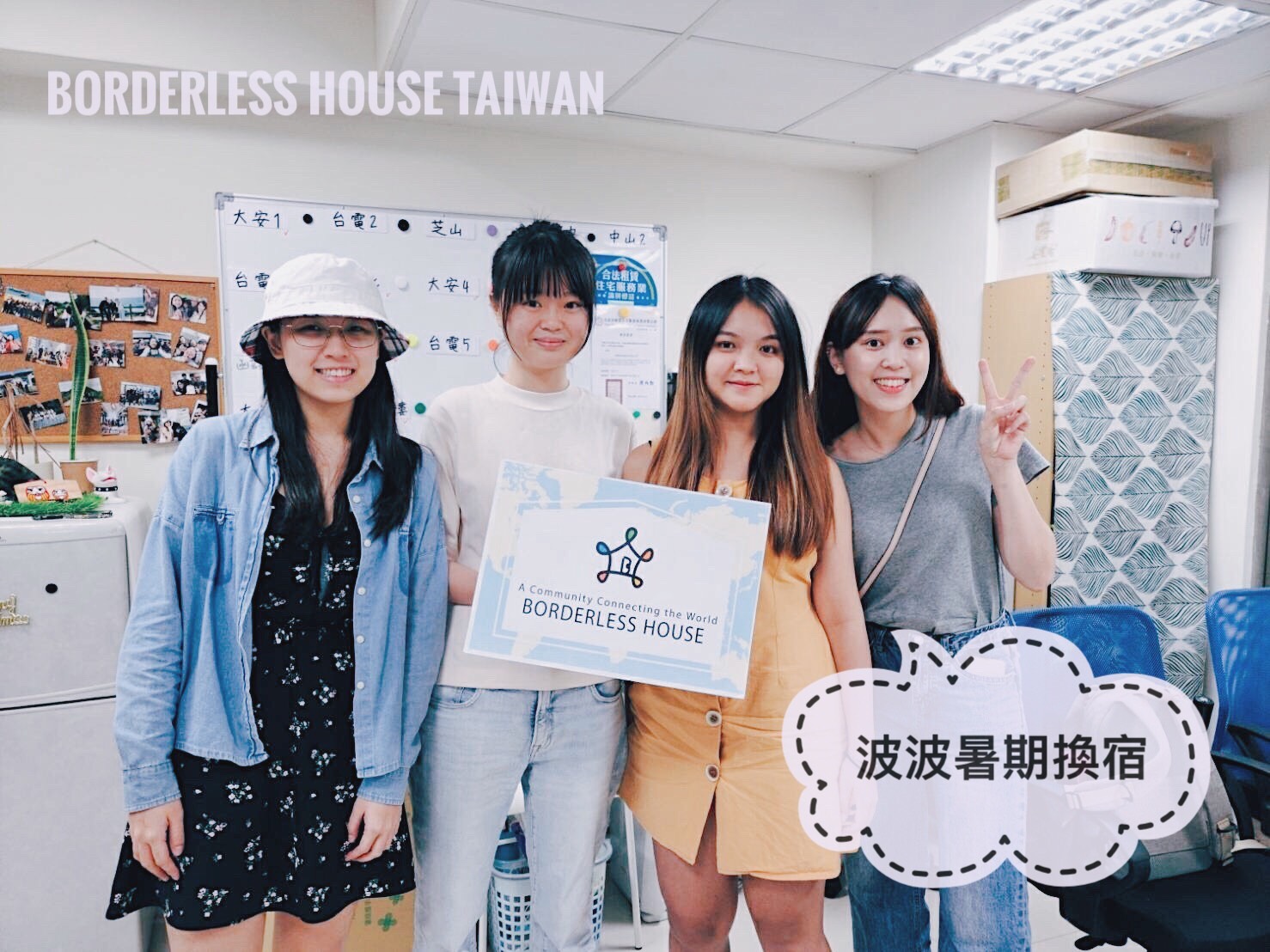

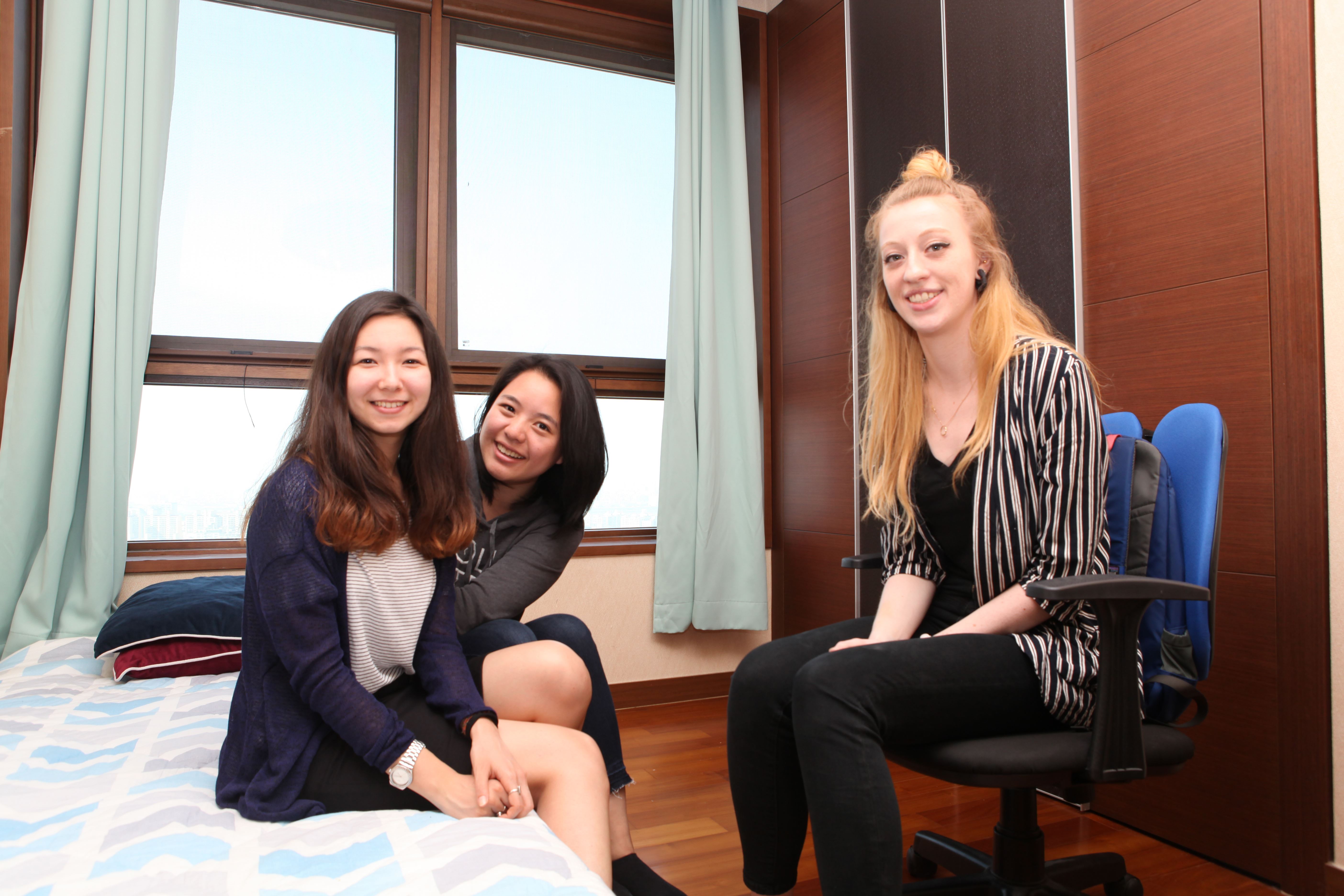











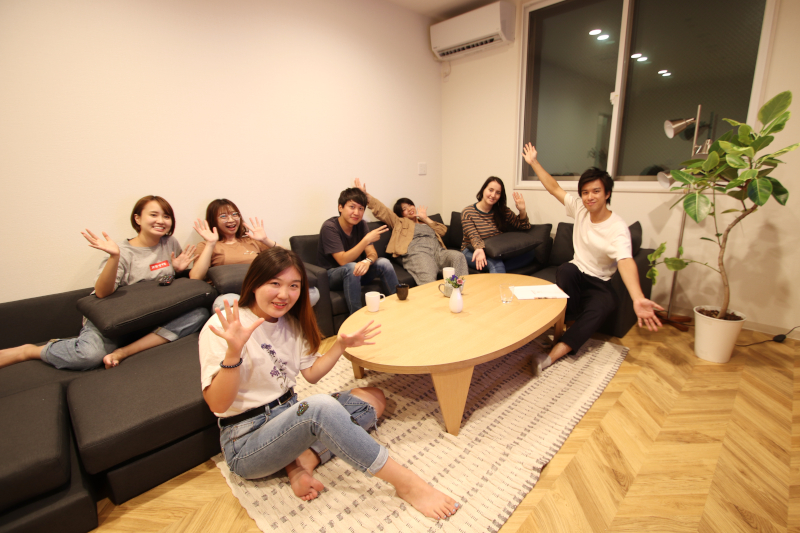
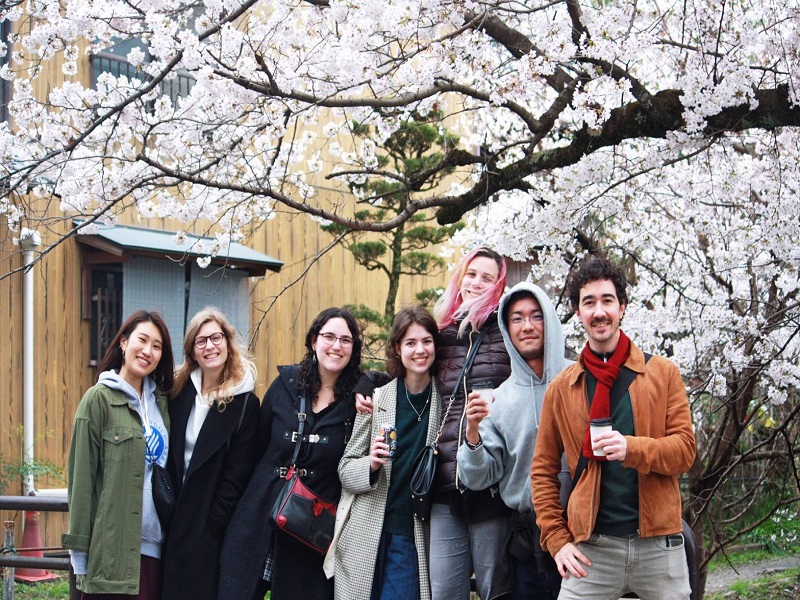
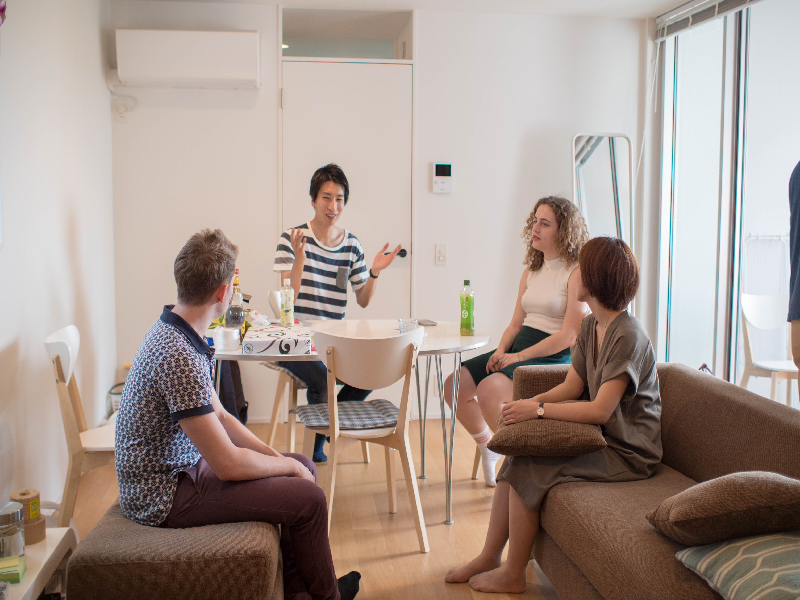
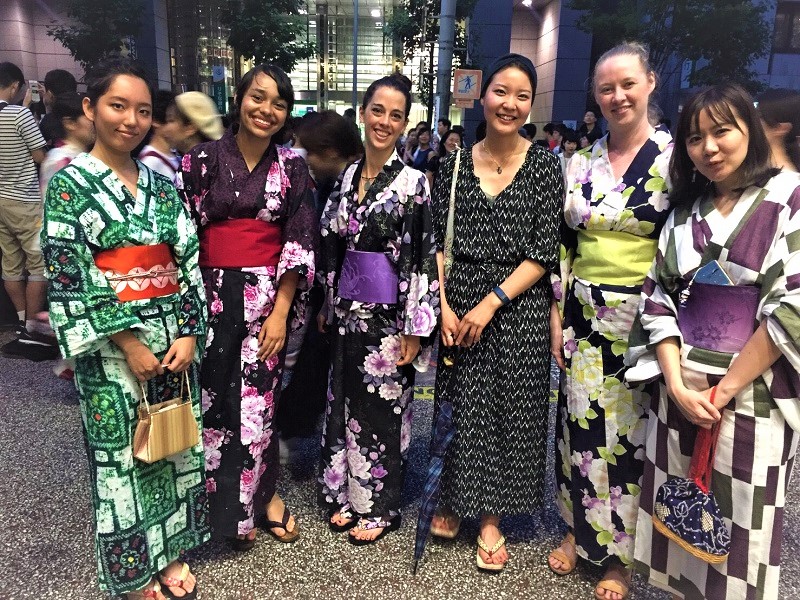
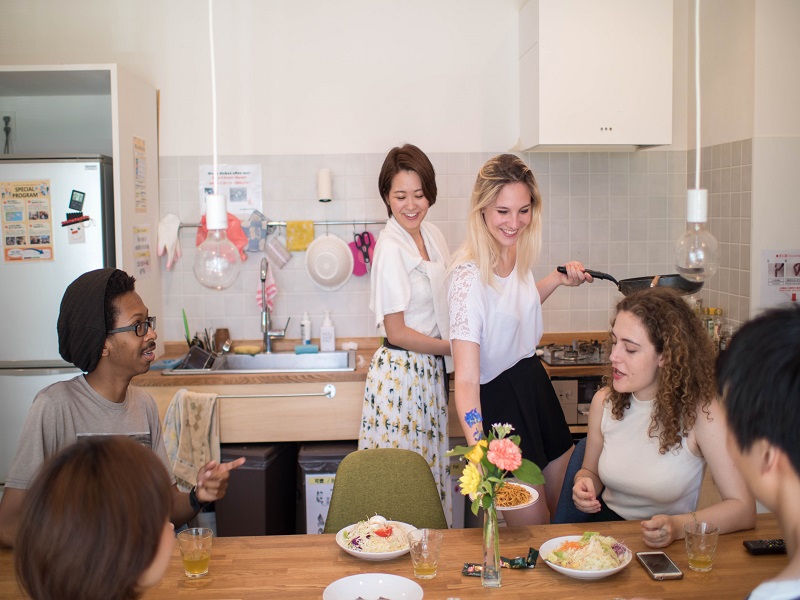
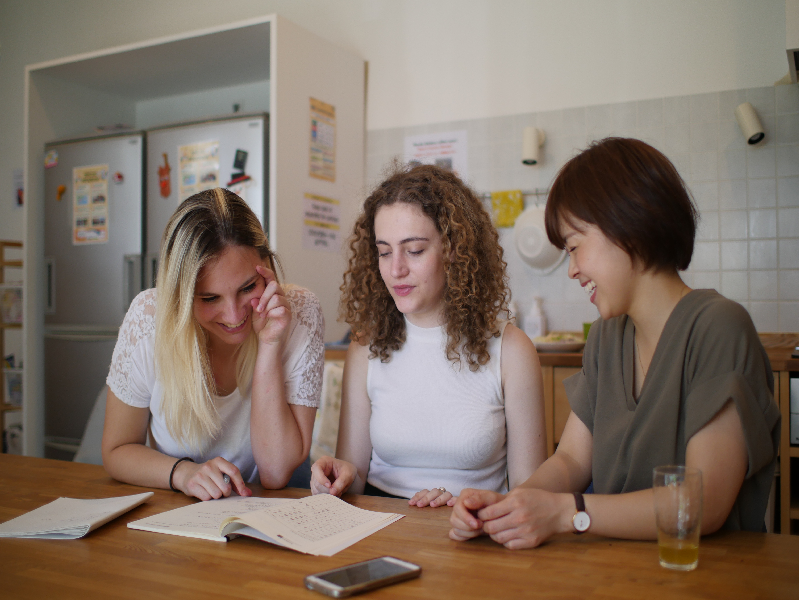

















 (手巻き寿司パーティーの時の様子)
(手巻き寿司パーティーの時の様子) ーIs there anything you decided to try out after moving in the sharehouse?
ーIs there anything you decided to try out after moving in the sharehouse? ーWhat made you decide to change your job?
ーWhat made you decide to change your job? ーFinally, please give one piece of advice to our future tenants!
ーFinally, please give one piece of advice to our future tenants!